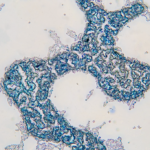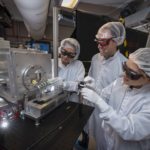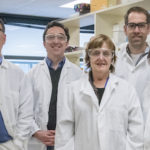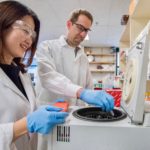A new study investigating the effect of thirdhand smoke (THS) in a mouse model system specially designed to mimic the genetic diversity of human populations has shed new light on how genetic predispositions contribute to an individual’s cancer risk. This work is an instrumental step towards building a more realistic understanding of how tobacco smoke residue could impact cancer risk in people.
Biomanufacturing Increases Available Supply of Anti-cancer Drug
The supply of a plant-derived anti-cancer drug can finally meet global demand after a team of scientists from Denmark and the U.S. engineered yeast to produce the precursor molecules, which could previously only be obtained in trace concentrations in the native plant. A study describing the breakthrough was recently published in Nature. The international team included four researchers from the Biological Systems and Engineering Division: Leanne Jade G. Chan, Edward Baidoo, Christopher J. Petzold, and Jay D. Keasling.
A Laser-powered Upgrade to Cancer Treatment
Researchers in the Biological Systems and Engineering (BSE) Division are collaborating with colleagues at the Berkeley Lab Laser Accelerator (BELLA) Center to adapt the nascent technology of laser-driven ion accelerators to make a more effective type of radiation more readily available to patients. The mutually beneficial partnership gives BELLA scientists a real-world application around which to refine their experimental laser platform, and gives the biologists a chance to test how living tissue responds to laser-driven proton beams at FLASH dose rates.
New Round of Funding for Thirdhand Smoke Research
 Berkeley Lab thirdhand smoke researchers have been awarded a new three-year grant totaling $904,744. The funding from the Tobacco-Related Disease Research Program (TRDRP) will support translational studies aimed at mitigating health impacts of exposure to thirdhand smoke (THS)—the toxic residues from tobacco smoke that linger on indoor surfaces and in dust long after a cigarette has been extinguished. From the Biosciences Area, Biological Systems and Engineering (BSE) Division staff scientist Bo Hang will serve as principal investigator on the studies, with senior scientist Jian-Hua Mao and staff scientist Antoine Snijders, also of BSE, as co-investigators. Collaborators on the project include staff scientist Hugo Destaillats and retiree affiliate Lara Gundel in the Energy Technologies Area (ETA) at Berkeley Lab, as well as researchers at California Consortium on Thirdhand Smoke partner institutions UC San Francisco and UC Riverside.
Berkeley Lab thirdhand smoke researchers have been awarded a new three-year grant totaling $904,744. The funding from the Tobacco-Related Disease Research Program (TRDRP) will support translational studies aimed at mitigating health impacts of exposure to thirdhand smoke (THS)—the toxic residues from tobacco smoke that linger on indoor surfaces and in dust long after a cigarette has been extinguished. From the Biosciences Area, Biological Systems and Engineering (BSE) Division staff scientist Bo Hang will serve as principal investigator on the studies, with senior scientist Jian-Hua Mao and staff scientist Antoine Snijders, also of BSE, as co-investigators. Collaborators on the project include staff scientist Hugo Destaillats and retiree affiliate Lara Gundel in the Energy Technologies Area (ETA) at Berkeley Lab, as well as researchers at California Consortium on Thirdhand Smoke partner institutions UC San Francisco and UC Riverside.
A New Mouse Model for Studying Stomach Cancer
An international team led by researchers in Berkeley Lab’s Biosciences Area has identified a new laboratory mouse strain for studying gastric cancer. The mouse lineage is part of a population called the Collaborative Cross (CC) mouse model that was bred to have greater genetic diversity than previous populations, so as to be more comparable with humans. The team monitored hundreds of mice from different CC strains for one year and observed that one line spontaneously developed tumors—stomach and lymphoid being the most prevalent types—at an extremely high rate. Subsequent genetic analysis of the tumors in this cancer-prone line revealed that an inflammatory response regulating a protein called Nfκb1 could be a key driver of cancer susceptibility in this mouse model.
Read more in the Berkeley Lab News Center.
Was this page useful?








